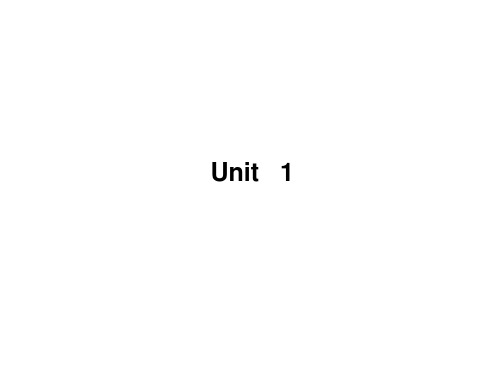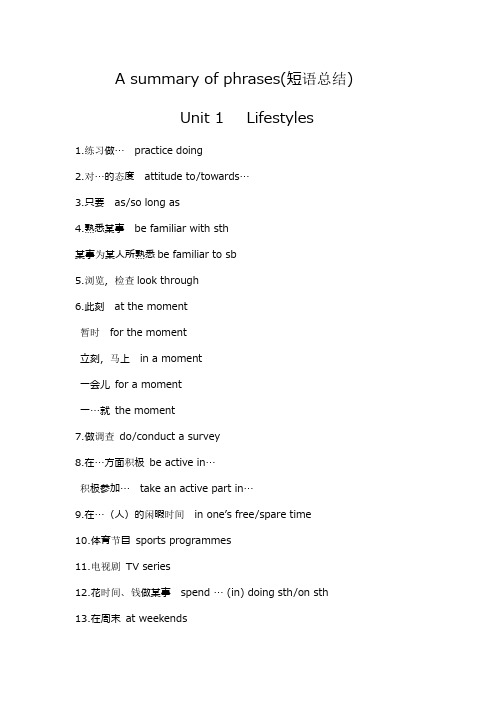Phrases for Unit 1 M 2
- 格式:doc
- 大小:40.00 KB
- 文档页数:3




Module1 Unit1教学设计课时主备教案课型Welcome + WordpowerLearning objectives:By the end of this period, students will be able to1. enlarge their own knowledge by knowing the differences between American English and British English in pronunciation, grammar, vocabulary and spelling;2. improve their spoken skills by describing their own experiences or speaking about what they have heard or seen in the past tense;3. be aware of the sense of language by learning some English colloquialisms.Focus of the lesson:1. relations between parents and teenagers2. differences between American English and British English3. different colloquialismsPredicted area of difficulties:1. how to improve the relationships between parents and teenagers if they are not so good;2. how to use colloquialisms properly.Learning aids:1. PPT2. blackboard课型Reading(I)Learning objectives:By the end of this period, students will be able to1. know more information about American family life;2. learn the basic skills of how to read a play and act out the play with the help of a teacher;3. form a positive attitude towards growing pains.Focus of the lesson:1. characteristics of a play;2. a performance of a play;Predicted area of difficulties:How to act in the play?Learning methods:1. PPT2. blackboard课型Reading(II)Learning objectives:By the end of this period, students will be able to1. write out the transformation of the key words and phrases correctly;2. use the key words properly in relevant tasks;3. know some words and phrases in a play;4. raise the awareness of learning new words or phrases in a context.Focus of the lesson:1. usage of the key words and expressions;2. verb tenses in a play and some stage instructions.Predicted area of difficulties:1. the usage of the following words and phrases …follow‟ …be supposed to do‟ …tolerate …deserve‟and so on;2. the proper usage of relative adverbs.Learning aids:1. PPT2. blackboardLearning procedures:课型Grammar & UsageLearning objectives:By the end of this period, students will be able to1. better understand the grammatical functions of attributive clauses;2. use prepositions +which / whom3. use relative adverb s …when‟ …wh ere‟ …wh y‟ ;4. enjoy the neatness & beauty of attributive clauses comparing them with simple sentences. Focus of the lesson:1. the usage of relative adverbs;2. the exchange of “prepositions +which” and relative adverbs.Predicted area of difficulties:1. the usage of relative adverbs;2. how to distinguish relative pronouns and relative adverbs.Learning aids:1. PPT2. blackboardLearning procedures:课型TaskLearning objectives:At the end of this lesson, students will be able to:1. understand the main points and the mood of the writer by reading four diary entries.2. know how to write a letter for advice and a letter of reply.3. know a better way to solve the problem between teenagers and parents.Focus of the lesson:Reading for key points and main idea.Predicted learning difficulties:How to get the key points in a diaryLearning aids:1. PPT2. blackboardLearning procedures:课型ProjectLearning objectives:By the end of this period, students will be able to:1. know what are growing pains;2. identify the three types of changes of growing pains;3. learn to deal with the changes properly and develop healthily both physically and mentally.Focus of the lesson:1. three kinds of changes;2. proper ways to deal with them;Learning aids:1. PPT2. blackboardLearning procedures:。


A summary of phrases(短语总结)Unit 1 Lifestyles1.练习做… practice doing2.对…的态度 attitude to/towards…3.只要 as/so long as4.熟悉某事 be familiar with sth某事为某人所熟悉be familiar to sb5.浏览,检查look through6.此刻 at the moment暂时 for the moment立刻,马上 in a moment一会儿 for a moment一…就 the moment7.做调查 do/conduct a survey8.在…方面积极 be active in…积极参加… take an active part in…9.在…(人)的闲暇时间 in one’s free/spare time10.体育节目 sports programmes11.电视剧 TV series12.花时间、钱做某事 spend … (in) doing sth/on sth13.在周末 at weekends在工作日 on weekdays14.打开 turn/switch on关上turn/switch off转换switch over15.做运动 do/take some exercise/sports16.过…的生活live/lead a … life/lifestyle17.遥控remote control18.爆炸;响go off19.占据;以…为兴趣;从事;继续take up20.充满be filled with/be full of21.枯燥,乏味get bored22.向…抱怨…complain to sb about sth23.因…遭受suffer from…24.减肥 lose weight增加体重 put on/gain weight25.忍受不了做…can’t stand/bear doing sth26.更喜欢做A而不是B prefer to do A rather than do B27.轮流做…take turns to do/doing sth28.毕业于… graduate from …29.某事的原因 reasons for30.以..为骄傲be proud of/take pride in31.认识,了解get to know32.专为…设计,专为…使用 be intended for…33.想象做某事imagine doing sth34.免于…free of …免费free of charge35.休息一下take a break36.与…不一样not so/as …as…37.喜欢 be fond of…38.天气预报 weather forecast39.远程学习 distance learning40.与…相似 be similar to…41.常规生活 routine lifedaily routine42.在几年间over the years43.结果as a result44.除了(包括或不包括在内) apart from/aside from45.在社交场合on social occasions46.起重要作用 play an important part/role in…47.想出come up with…48.期待做…look forward to doing sth49.振作,高兴起来 cheer up50.有影响,重要 make a difference51.陷入交通阻塞be stuck in a traffic jam52.中肯,切题,恰当 keep…to the point53.熬夜stay up late54.介意做…mind doing sth…55.以…为背景be set in…56.很可能做…be likely to do sth/that…57.尽力、努力做…try to do sth设法、成功做…manage to do sth58.属于某人自己的of one’s own59.故意地by designon purpose60.应该,被期待做…be supposed/expected to do…61. 挑战某人某事: challenge sb. to sth.。
Key phrases of Unit 1 and Unit 2 (第一、二单元重点短语)Unit11.pen pal 笔友2.be from Canada 来自加拿大e from Australia 来自澳大利亚4.live in Tokyo, Japan 居住在日本东京5.live on the first floor 住在一楼6.what language什么语言7.many countries许多国家8.speak English说英语9.a little French一点法语9.in China在中国10.an interesting country一个有趣的国家11…years old ….岁12.like doing sth喜欢做….13.go to the movies去看电影14.play sports做运动15.my favorite…我最喜爱的…16.too difficult太难17.write to me写信给我18.tell me about yourself告诉我关于你的事19.likes and dislikes喜欢的事和讨厌的事20.tell sth to sb把…告诉某人Unit21.post office邮局2.there be…有…3.on Center Street在中央大街4.the center of……的中央5.near here在这附近6.far from…离…远7.across from…在…对面8.next to…在…旁边9.in front of…在…前面10.behind…在…后面11.between A and B 在A和B之间12.in the neighborhood在附近13.turn left/ turn right向左转/向右转14.go straight笔直走15.go down…沿着…走16.go straight down 沿着…一直走17.on the right/ on the left 在右边/在左边18.on the right of…在…的左边19.thanks a lot/ thank you very much非常感谢20.you’re welcome 不用谢21.excuse me对不起;打扰了22.a clean park一个干净的公园23.a quiet street一条宁静的街道24.an old hotel 一家旧旅馆25.near your house你家附近26.welcome to…欢迎来到…27.enjoy doing sth享受做…的乐趣;喜欢做…28.enjoy yourself(你)玩的愉快29.take a walk散步30.walk through…穿过…31.a house with a garden带花园的房子32.the beginning of…. …的开始33.visit Bridge Street参观大桥街34.visit your friend看望你的朋友35.a good place to do sth一个做…的好地方36.have fun/ have a good time玩的愉快37.play the guitar弹吉他38.be arriving就要到了39.arrive at the airport 到达机场40.arrive in Beijing到达北京41.get to …到达…42.next Sunday下周日43.this Sunday这周日44.let me tell you让我告诉你45.the way to…去…的路46.from A to B从A到B47.take a taxi打的48.pass a bank经过一家银行49.go through…穿过50.hope to do sth希望做…51.have a good trip旅途愉快52.turn left at…在…(处)左转53.get off下车。
中职英语基础模块1 unit2Unit 2: Greetings and IntroductionsVocabulary:1. Greetings - words or actions used to say hello or welcome someone.2. Introductions - the act of making someone known to others.3. Formal - following established conventions or rules.4. Informal - relaxed and casual.5. Polite - having or showing good manners or respect for others.6. Respectful - showing admiration or deference towards someone.7. Handshake - a formal way of greeting someone by clasping their hand and shaking it.8. Bow - a gesture of respect or reverence made by bending the body forward from the waist.9. Hug - to hold someone tightly in one's arms, typically to express affection.10. Kiss - to touch or press one's lips against someone or something as a greeting or to show affection.Phrases:1. How are you? - a common greeting used to ask about someone's well-being.2. Nice to meet you - a polite phrase used to express pleasure in meeting someone for the first time.3. What's your name? - a question used to ask someone's name.4. My name is... - a phrase used to introduce oneself by stating their name.5. Where are you from? - a question used to ask someone's place of origin.6. I'm from... - a phrase used to state one's place of origin.7. How old are you? - a question used to ask someone's age.8. I'm... years old - a phrase used to state one's age.9. Goodbye - a common farewell used to say goodbye to someone.10. See you later - a casual phrase used to say goodbye with the intention of seeing the person again.Sentences:1. Hello, how are you?2. Nice to meet you, my name is John.3. Where are you from?4. I'm from China.5. How old are you?6. I'm 18 years old.7. Goodbye, have a nice day!8. See you later, take care!Dialogues:Dialogue 1:A: Hello, how are you?B: I'm good, thank you. How about you?A: I'm great, thanks for asking. Nice to meet you, my name is Lisa. B: Nice to meet you too, Lisa. I'm Mike.Dialogue 2:A: Where are you from, Mike?B: I'm from the United States. How about you, Lisa?A: I'm from China.B: That's interesting. How old are you?A: I'm 20 years old. And you?B: I'm 22. Goodbye, it was nice talking to you.A: Goodbye, see you later!Note: The above dialogues are just examples and can be modified or expanded upon based on the context and individuals involved.。
Phrases for Unit 1 M 21.be puzzled with / about / by /over 对。
感到迷惑 a puzzling problem, a puzzledlook/expression2.step up3.search sb 搜某人的身search a place 搜索某地search for 搜寻。
search sb/sth forsth 搜某人身(某地)为了找到某物in search of / in one’s search for 搜寻。
4.due to 由于owing to 由于,因为thanks to 多亏5.show up =turn up 出现,露面6.witness to sth 。
的目击者见证Recent years have witnessed (=seen)China’s rapid growth in economy.7.do / carry out research into/on 对。
进行研究= research(into/ in / on)sth8.rule out the possibility of9.look into 调查10.make up 编造,编制,杜撰~ an excuse 编造一个借口make up for (弥补,补偿)the losttime11.in case 以防万一in case of 以防。
in no case =in no way = by no means=at no time=under no circumstances 绝不in any case 无论如何in this/ that case 在这(那)种情况下12.convince sb of sth 使某人相信某事sb be convinced of/ that…某人(被说服)相信。
13.make progress in14.in (outer) space15.be disappointed with sb at sth 对某人某事感到失望16.be wild with joy 欣喜若狂17.be similar to… in…在。
方面与。
相似18.shoulder by shoulder =side by side 肩并肩e into being / existence 产生20.possible possibly possibility can’t possibly do sth 不可能做某事21.the reason for doing sth (做)某事的理由for the reason of 因为。
原因for this reasonfor some reason 因为某种原因22.show/take/have interest in develop an interest in 对。
渐渐产生兴趣23.stay out 呆在外面不回家stay up 不睡觉24.they saw Justin walking towards his home (看到的不是全程) I heard him put on hisfavourite CD.(听到的是全程)25.give up/call off/put off 放弃、取消、推迟做某事e true 实现one’s dream come true live/realize one’s dream27.report doing sth28.make one’s way to 到。
去29.be said to do it is said that…1.take/ go on an adventure 进行一次冒险2.in the dark 在黑暗中after dark 天黑后3.turn sth upside down4.whatever however whenever 可以引导名词性从句及状语从句no matter what 等只能引导状语从句5.supply sth to sb =supply sb with sth 向某人供应某物provide sb with sth=provide sth forsb 向某人提供某物food supplies =supplies of food6.scare 使恐惧scaring 令人恐惧的,scared (感到)恐惧的be scared of 对。
感到恐惧7.at sunset/dawn/sunrise8.bite bit bitten9.envy sb sth 嫉妒某人某物be the envy of sb 成为某人嫉妒的对象10.be scheduled to do 安排、计划做某事11.reach 延伸达到within /out of/beyond one’s ~ 在某人够得着/不着reach for 伸手去够12.claim to do 声称、主张要做某事13.in harmony with14.be busy doing sth be busy with sth15.can’t wait to do sth = be eager to do16.up close17.be home to 是。
的家园18.be in the habit of doing 有做。
的习惯out of habit 出于习惯19.at one’s mildest 在。
最温和的时候at one’s best /worst 在某人最佳、最差状态20.be tired of 对。
感到厌倦be tired with /from 因。
感到疲劳1.be curious to do sth / about sth2.set sail for3.make a discovery (of )4.empty …of…5.all the people present(在场的后置定语)the present situation(现在的前置定语) bepresent at presence 在场absence不在during one’s absence/presence 在某人(不)在场时present sb with sth /present sth to sb将某物展示给某人sth be presented to sb sb be presented with sth6.have a high fever7.as a result 结果as a result of 作为。
的结果with no result=with no good 不成功resultfrom 从。
得来的结果result in 得出。
结果,导致resultful 硕果累累的resultless 没成果的8.sth is certain it is certain that (主语为物)sb is sure(主语为人)That’s for sure. 那是肯定的。
9.base sth on 将。
构筑在。
基础之上sth be based on Einstein based his theory onscientific research. A theory based on experiments 一个基于实验的理论(过去分词做后置定语)10.a greal/good deal of +不可数an large/good amount/sum of +不可数 a good manypeople a good many of the people a number of +可数 a large quantity of 可数、不可数large quantities of 后面不管可数不可数做主语都是复数pare A to B 把。
比作。
(不同性质比较) compare A with B 将A与B进行比较(同种性质比较)compared with/ to 用作状语没区别12.upon doing sth upon arriving=upon one’s arrival13.warn sb (not)to do sth 警告某人(不)做某事warn sb against doing sth 警告某人不要做某事warn sb of sth 警告、提醒某人某事14.prove=be seen or found out at last; turn out 最终被看出发现。
,结果是,原来是15.be qualified for16.manage to do =succeed in trying to do 设法做成某I can manage it myself.这事我自己能行。
17.live one’s dream (不用于被动)=realize one’s dream(可用于被动) 实现梦想one’s dreamcome true (不用于被动)梦想实现18.be of good /high quality (具有)高品质的19.fall ill with 因为。
病倒20.have sth/nth/little/much to do with 与。
有关系21.some –others- still others22.if (they are)breathed in23.protect sb from sth24.die of grief 哀伤而死(指情感因素)die from a sword wound 死于剑伤(指外伤因素)用于病名前两者没区别25.solve/explain a mystery26.set foot on/in 踏上27.sink sank sunk a sunken ship28.wok towards an achievement 朝某一成绩努力29.win sb sth 为某人赢得某物30.look up to 敬仰。